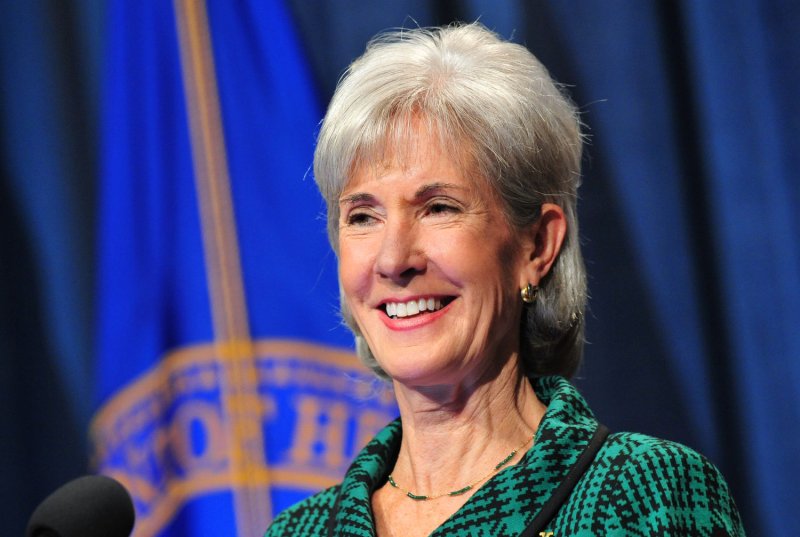U.S. Health and Human Services Secretary Kathleen Sebelius and her department will have a much larger role in running the state healthcare exchanges than initially anticipated because so many states have opted to leave the details to the federal government. 2011 file photo. UPI/Kevin Dietsch |
License Photo
Now that the U.S. election is over, talk of repealing President Obama's signature healthcare reform law can be relegated to the rhetorical scrap heap -- although House Speaker John Boehner last week raised the possibility of including talk of modification in the discussions over the so-called fiscal cliff.
Republicans took to referring to the Affordable Care Act pejoratively as "Obamacare." But Obama co-opted the term: "I have become fond of this term, Obamacare," Obama said during the first debate against GOP presidential challenger Mitt Romney, whose Massachusetts healthcare initiative served as a model for the federal law.
Deadlines are looming for states to set up healthcare exchanges mandated by the ACA. They can either run their own, opt for the federal government to take care of it or set up a partnership with the feds. Florida, Idaho, Indiana, Montana, New Jersey, Pennsylvania, Tennessee, Utah, Virginia and West Virginia were undecided as of Friday and have until Dec. 14 to decide whether to go it alone or until Feb. 15 to decide whether to partner with the Department of Health and Human Services or let the federal government run the whole shebang.
Arkansas, Delaware, Illinois, Michigan, North Carolina and Ohio are planning to go into partnership with the federal government. Seventeen states -- Alabama, Alaska, Georgia, Kansas, Kentucky, Louisiana, Maine, Missouri, Nebraska, New Hampshire, North Dakota, Oklahoma, South Carolina, South Dakota, Texas, Wisconsin and Wyoming -- so far have opted to relinquish control.
That leaves only 17 states opting for the do-it-yourself approach so far.
Enrollment begins in October 2013 with the system to be running full bore by Jan. 1, 2014. Those who refuse to buy insurance will face a penalty -- the administration called it a fine but the U.S. Supreme Court ruled it a tax, constitutional, but a tax all the same.
After the states decide what to do, insurance companies will have to inform them about policy offerings. Insurers can't make any decisions, however, until HHS lays out all the rules.
Among the reasons cited most often for implementing the ACA is the provision limiting insurers' ability to reject people with pre-existing conditions. Currently insurers' rejection options are limited under group policies but consumers have no such protections on the individual market.
"The Affordable Care Act prohibits new plans in the individual market from imposing pre-existing condition exclusions on children under the age of 19, and the Genetic Information Non-Discrimination Act prohibits insurers from excluding a pre-existing condition because of genetic information in the absence of a diagnosis of a condition," the Kaiser Family Foundation says.
Currently, states deal differently with the issue.
"Eighteen states use the objective standard definition for pre-existing conditions, under which the insurer can only refuse to pay for treatment of a condition if the patient received an actual diagnosis or treatment for the condition prior to coverage. Twenty-four states allow insurers to use the broader prudent person standard. Eight states and the District of Columbia have not adopted any definition of pre-existing condition," Kaiser notes.
"Thanks to the health care law, no one will be discriminated against because of a pre-existing condition," HHS Secretary Kathleen Sebelius said last week.
The law also limits insurers' ability to vary premiums based on age and other factors, a rule lauded by AARP.
"The proposed rules prohibiting insurance companies from raising premiums based on pre-existing conditions, health status, gender or occupation are other critical steps forward in guaranteeing access to affordable coverage," said Executive Vice President Nancy LeaMond.
Boehner, meanwhile, in an op-ed piece last week in the Cincinnati Enquirer argued that for all the good the ACA does, it drives up costs, adding to the debt and hindering economic recovery.
"The tactics of our repeal efforts will have to change," Boehner, R-Ohio, said in reference to the dozens of House votes in the last two years to repeal the law that went nowhere in the Democrat-led Senate.
"The president's health care law adds a massive, expensive, unworkable government program at a time when our national debt already exceeds the size of our country's entire economy. We can't afford it, and we can't afford to leave it intact. That's why I've been clear that the law has to stay on the table as both parties discuss ways to solve our nation's massive debt challenge. ...
"Over the past couple of years, I have noted there are essentially three major routes to repeal of the president's law: the courts, the presidential election process and the congressional oversight process. With two of those three routes having come up short, the third and final one becomes more important than ever."















